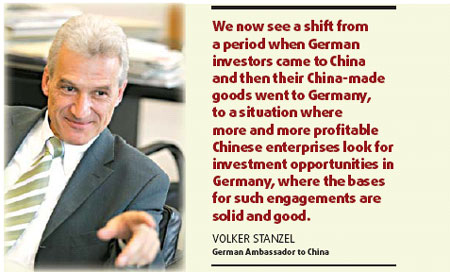Fruitful exchanges growing
German President Horst Kohler is paying a state visit to China from May 23 to 26 at the invitation of Chinese President Hu Jintao.
After visiting Vietnam, Kohler arrived yesterday at Lijiang in Southwest China's Yunnan Province - the first stop for his four-day trip to the country. This southwestern city with a long history is famous for its rich cultural heritage.
During the president's stay in China, new agreements to promote bilateral cultural exchange are expected to be signed by the two countries, said Volker Stanzel, German Ambassador to China.
Cultural exchange is at the root of people-to-people communication. Stanzel cited the example of Goethe Institute to illustrate Germany's efforts to promote its culture overseas.
Aided by German government sponsorship, the institute with a 56-year history has long been dedicated to its main objective of "presenting German society and culture" to people abroad.
Language teaching is just a part of the institute's work, but that is not all, Stanzel emphasized.
The institute's Beijing branch is organizing various activities, such as exhibitions and conferences, the screening of films, and introduction to literature, in order to showcase the charms of German culture.
The ambassador noted that a Chinese cultural center, "equivalent to the Goethe Institute in Beijing," is under construction in Berlin and expected to begin operations at the end of July.
A three-year campaign entitled "Germany and China-Moving Ahead Together" will seek to offer the Chinese an opportunity to approach and understand German life in a wide range of fields, such as architecture, culture, lifestyle and environment, without having to leave the country.
The kick-off for the campaign will be in Beijing when Germany is this year's guest country at the Beijing Book Fair.
From then on every six months one of China's fast -growing second-tier cities like Nanjing and Chengdu will be targeted by the campaign until it ends at the World Expo 2010 Shanghai, China.
He noted that "Germany and China-Moving Ahead Together" will focus on the "fast-growing urban middle-level income," a group the ambassador described as having a high educational level and showing active interest in German culture and society.
Frequent contact
"I see the need felt by both sides for more regular exchanges," said the German ambassador.
Top leaders of the two governments have been telephoning each other more often than ever to discuss issues at hand, he added. "It seems to have become a tradition that both leaders see each other more than once a year."
While the German President is now in Beijing and Chancellor Angela Merkel is expected to visit China in August, Chinese President Hu Jintao will fly to Germany in June to attend the G8 Summit.
China and Germany are strengthening bilateral ties through high-level meetings and talks between top officials and cabinet leaders of the two nations, the ambassador pointed out.
Significant Shift
Close political relations between the two countries are also generating a positive influence on their economic exchanges.
China's trade with Germany contributes roughly 30 percent of China-EU trade, Stanzel said.
On the other hand, China has replaced Japan to become the top Asian trading partner of Germany.
"I'm quite convinced that a significant part of Germany's economic growth depends on our relationship with East Asian and South Asian countries," in which "China plays a central role", said Stanzel.
Meanwhile, the booming bilateral trade and investment have boosted China's growth and modernization of its economy, he said.
"We now see a shift from a period when German investors came to China and then their China-made goods went to Germany, to a situation where more and more profitable Chinese enterprises look for investment opportunities in Germany, where the bases for such engagements are solid and good," the ambassador explained.
Another shift the ambassador noted is in industrial structure and export composition.
Because of its technological strength, Germany still maintains an edge in sectors such as the manufacture of automobiles, aircraft and high-speed trains.
Environmentally friendly and resource-saving technologies are the forte of German companies, which satisfy the needs of China looking for environmentally sound and more balanced growth, Stanzel said.
Some German-invested projects involving the use of clean energy such as wind and solar energy are now in operation in China, helping some less developed regions that earlier had no access to power to get a taste of modern living.
(China Daily 05/24/2007 page25)














